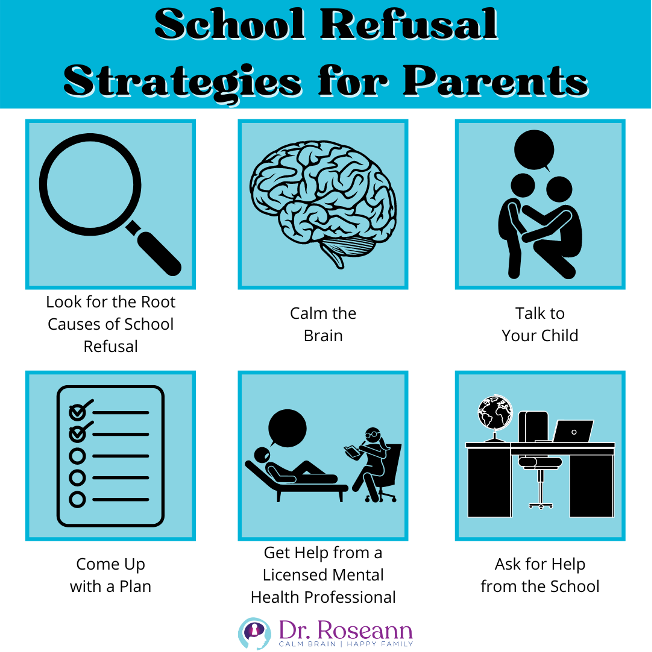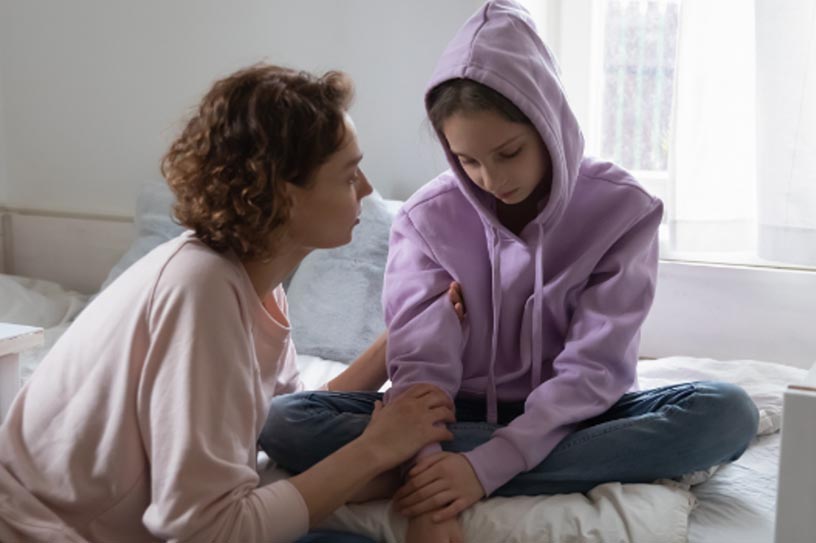What is a School Refusal?
This is a 3- Part Series on School Refusal
How Neurofeedback Helps School Refusal Behaviors and Underlying Root Issues
School refusal behavior refers to the avoidance of a child or teen to attend school and/or persistent difficulty staying in the classroom throughout the school day (Inglés et. al., 2015). For most families, when a child refuses to attend school, there is also a mental health crisis that affects the whole family.
When a child shuts down due to emotional distress, parents don’t know what to do or who to turn to for help. Sometimes school personnel can offer help but ultimately it falls on parents to get their kids to school. For some, parents are blindsided by school avoidance and other times it is just another hurdle in a long mental health journey.
School refusal is often an external symptom that reflects a mental health diagnosis, such as separation anxiety, social anxiety disorder, generalized anxiety disorder, obsessive compulsive disorder, specific phobia, major depression, oppositional defiant disorder, post-traumatic stress disorder, adjustment disorder, PANS/PANDAS, attention-deficit hyperactivity disorder or other clinical issues.
How Common is School Refusal?
Statistics show that school refusal affects 2% to 5% of all school-age children (Kawsar, Yilanli and Marwaha, 2022). These rates have risen from 1% of all school children in 2001 (Heyne, 2001) and will likely increase with crisis levels of stress and mental health issues in children in the US and across the globe.
Without proper parent education and solution-focused training, parents are ill equipped to manage child and teen behaviors. All parents have the power to support their child’s mental health and that is why I am on a mission to show parents just how to do that with books, programs, and information.
What are Signs and Symptoms of School Refusal?
School refusal is more than just having your kid get to school on time. It is a problem when your child misses multiple school days or struggles to get to or stay in school, which results in experiencing anxiety, distress or some other mental health or behavioral symptom.
For some kids it is a gradual buildup with your child's school probably calling you to talk about tardiness and absences or maybe even a change in grades or behavior. For others, it could be a sudden onset of school avoidance or refusal that may be hard to piece together why.
Signs and Symptoms Associated with School Refusal
- Muscular weakness
- Dizziness
- Gastro-intestinal distress or abdominal pain
- Nausea, vomiting, diarrhea
- Pain, such as back pain, diaphoresis, joint pain
- Headaches
- Shakiness/trembling
- Heart palpitations or chest pains
- Sleep difficulties
- Recent stressful life events like moving or starting a new school, loss and grief
- Bullying
- Intrusive thoughts or irrational fears
- Phobias
- Separation anxiety
- Infectious disease or PANS/PANDAS
- Mental health issues such as anxiety, depression, or OCD
How School Refusal Affects Kids and Families
School refusal is a challenge for children, families, and school personnel. The stress of facing each morning with your tearful, avoidant and/or tantruming child is hard on everyone. Refusing to go school has significant short and long-term effects on children's social, emotional, and educational development and more importantly on the self-esteem of a child.
No child really wants to not go to school, they simply lack the coping mechanisms to manage whatever fear has hijacked their brain. Stress impacts the adult and child brain in the same way. When in a “rev state,” we go into a fight, flight, or freeze state. School refusal is really a reflection of the brain being in a freeze state.
What to do if a Child Refuses to Go to School
In today’s stressful world, we should all assume that our kids are impacted by stress in some way shape or form and make healthy ways to counter that part of our life. Looking for the signs of anxiety, depression, OCD and just general stress is where parents should start because identifying problems early and providing interventions to prevent further difficulties such as school refusal.
What can a parent do if their child refuses to go to school? Well, here are my top tips that I give to parents in my one-to-one BrainBehaviorReset™ Program.
School Refusal Strategies for Parents
When you child isn't getting to school, you need help! Here are some of the best school refusal strategies I have used with parents and school professionals over my three decades in supporting kids who refuse to get to or stay in school.
Look for the Root Causes of School Refusal
You have to identify the underlying problem before you try to get your child back to school. As much as we want to believe that getting them to return to school will magically make everything better, it never does. You have to look at why your child is refusing to go to school. I promise you, it isn't on purpose. There is something underlying that resistance.
When a child refuses to attend school, you have to act like a detective and look at that child's behavior. Ask yourself, “What is causing them to want to stay home?” Were there signs and symptoms of anxiety, social anxiety, OCD, PANS/PANDAS, depression, or some other mental health issue? Were there sleep problems, gastrointestinal issues, food restricting or over eating, a change in behavior, more or less emotionality or communication?
As Steve Jobs says, “You can only connect the dots looking backward.” That means it isn’t always easy to spot signs of distress especially when a child is getting good grades. As I always say, “Grades should never be a benchmark of good mental health,” especially due to the internalizing nature of clinical issues of ADHD, anxiety, depression, and OCD.
Kids can look like they are holding it together because of the structure of school, until they no longer can. With so much pressure on children and teens to get high marks in school, there is little room left for mental health.
Possible Underlying Issues of School Refusal
- Learning disability or dyslexia
- Lack of proper learning, social, emotional, or behavioral support at school
- ADHD or executive functioning
- Autism
- Social skill challenges
- Bullying
- Teacher or peer issues
- Anxiety
- Social anxiety
- Separation anxiety
- PANS/PANDAS/AE
- OCD
- Depression
- Suicidal ideation, feelings of self-harm, or self-mutilation behaviors
Calm the Brain
Without a calm brain, you are building a house on a shotty foundation. The way the brain works is that your nervous system must be calm and regulated for your brain to function the way it should. That means you can’t think, problem solve, manage stress, pay attention, or take action in a purposeful way if your brain isn’t calm.
As a neuroprotective feature, your frontal lobes shut down so you can act without thinking in a perceived “war state,” which happens whenever you go into fight, flight or freeze. And remember, school refusal means your child is shut down or in a “freeze” state.
You might be asking yourself, “How did my kid’s brain get stuck in such a stressed state?” Well, it can happen to anyone with today’s compounded stressor and no child is immune from stress if they aren't actively countering it.
Using tools such as neurofeedback, PEMF/BRT, meditation and breathing techniques are science-backed solutions used to calm the brain and restore balance to one’s thoughts and behaviors.
Talk to Your Child
Talking to your child is different from frustrated exchanges. Neither of you want this happening but you both can get through this when you focus on what and how you are saying things.
Psychoeducation about the underlying problem and thoughts and sensations that come along with stress and anxiety is a key component in addressing any mental health issue. The “just go to school” attitude isn’t going to help your child, and in fact, it will make it worse. Behind the external resistance of school refusal is an internal tornado of shame, guilt, fear and a complete sense of lack of control.
Your school age or high school aged child isn’t simply just avoiding school, they are avoiding their pain and fear because they have shut down. Trying to force a child who is refusing to go to school equates to getting a car with no oil to work properly… it just isn’t going to happen. You might get it working but driving a car with no oil means you might cause damage to the engine. With school refusal, if we don’t address those root causes, calm the brain and come up with a plan, then clinical anxiety or depression only worsens and a successful return to school becomes less likely.
Come Up With a Plan
You don’t just glide to the mountain summit, you climb it and stop at each basecamp along the way and the same can be said for getting out of a mental health crisis (because that is what school refusal is). Yes, the end goal is to get back to school, but what you need to do is strategically plan out the steps you need to take and hopefully have a mental health professional helping you along the way.
Your back to school for a school refusal child home plan should include:
- Structured activities and routine
- Learning activities (this may or may not be schoolwork)
- Assessment of the school environment
- Regular sleep schedule
- Healthy eating
- Physical activity
- Therapy appointments
- Daily brain calming activities
- Focus on family communication and family stress management
- Lots of hugs and positive interactions
- Social interactions with peers
- Following therapeutic treatment recommendations
Your back to school for a school refusal child home plan should not include:
- Trying to figure it out on your own without the help of a mental health professional
- Believing that medication without therapy will fix the problem
- Punishment
- Unlimited video games
- Unlimited device time or scrolling
- No sleep schedule
- Junk food
- Not having learning activities (can read, listen to books on tape, etc.)

Get Your Priorities Straight
Listen, the number one mistake I see of parents who are trying to help their school avoidant children is prioritizing getting back to school over mental health. Don’t get me wrong, school is important but nothing is more important than one’s mental health.
Most parents assume that if their child just gets back to school, everything will go back to “normal” but that is never the case because when you look at root causes, the signs and symptoms of mental health struggles are there.
School refusal is simply your child’s coping mechanism to deal with some other underlying problem and getting back to school isn’t going to be the magic wand you think. It is the same broken logic that my failure to launch families experience except they think getting a job or getting back to college will fix the problem. Behavioral change takes committing to focusing on the micro steps that create big waves.
Ask for Help From the School
A collaborative approach with school providers and staff, parents, and other mental health professionals is needed to help deal with school refusal. Don’t be embarrassed or afraid to let the school know your child is anxious about or refusing to go to school because addressing thighs early is paramount in overcoming school avoidance and refusal.
Get Help from Mental Health Professional
When your kid is struggling, your mama heart hurts. You need a lifeline and that comes from guidance from a trusted mental health professional. I work with many people local to the greater New York and Connecticut area, as well as remotely all over the world around school refusal and the problem is only increasing with the rise in children’s mental health issues.
The mental health professional you work with should be experienced with school refusal and have success with getting kids back to learning. When you find a trusted partner, you will feel good about following their guided steps and probably being pushed outside of your comfort zone as you get your kid and family back on track.
In our BrainBehaviorReset™ Program, we help families who are in a school refusal crisis get unstuck and bring back calm to families by combining the best of what is proven to work in calming the brain with therapy that addresses fear-driven thinking and behavior.
Citations:
Heyne, D., King, N. J., Tonge, B. J., & Cooper, H. (2001). School refusal: epidemiology and management. Paediatric drugs, 3(10), 719–732. https://doi.org/10.2165/00128072-200103100-00002
Inglés, C. J., Gonzálvez-Maciá, C., García-Fernández, J. M., Vicent, M., & Martínez-Monteagudo, M. C. (2015). Current status of research on school refusal. European Journal of Education and Psychology, 8(1), 37–52. https://doi.org/10.1016/j.ejeps.2015.10.005
Kawsar MDS, Yilanli M, Marwaha R. School Refusal. [Updated 2022 Feb 7]. In: StatPearls [Internet]. Treasure Island (FL): StatPearls Publishing; 2022 Jan-. Available from: https://www.ncbi.nlm.nih.gov/books/NBK534195/
Always remember… “Calm Brain, Happy Family™”
Disclaimer: This article is not intended to give health advice and it is recommended to consult with a physician before beginning any new wellness regime. *The effectiveness of diagnosis and treatment vary by patient and condition. Dr. Roseann Capanna-Hodge, LLC does not guarantee certain results.
Are you looking for SOLUTIONS for your struggling child or teen?
Dr. Roseann and her team are all about solutions, so you are in the right place!
There are 3 ways to work with Dr. Roseann:
- In-person at her Ridgefield, CT center
- Virtually with her at home neurofeedback and coaching programs
- By getting her BrainBehaviorReset™ Toolkit
You can get her books for parents and professionals, including: It’s Gonna Be OK™: Proven Ways to Improve Your Child’s Mental Health, Teletherapy Toolkit™ and Brain Under Attack: A Resource For Parents and Caregivers of Children With PANS, PANDAS, and Autoimmune Encephalopathy.
If you are a business or organization that needs proactive guidance to support employee mental health or an organization looking for a brand representative, check out Dr. Roseann’s professional speaking page to see how we can work together.
Dr. Roseann is a Children’s Mental Health Expert and Therapist who has been featured in/on hundreds of media outlets including, CBS, NBC, FOX News, PIX11 NYC, The New York Times, The Washington Post,, Business Insider, USA Today, CNET, Marth Stewart, and PARENTS. FORBES called her, “A thought leader in children’s mental health.”
She is the founder and director of The Global Institute of Children’s Mental Health and Dr. Roseann Capanna-Hodge. Dr. Roseann is a Board Certified Neurofeedback (BCN) Practitioner, a Board Member of the Northeast Region Biofeedback Society (NRBS), Certified Integrative Medicine Mental Health Provider (CMHIMP) and an Amen Clinic Certified Brain Health Coach. She is also a member of The International Lyme Disease and Associated Disease Society (ILADS), The American Psychological Association (APA), Anxiety and Depression Association of America (ADAA) National Association of School Psychologists (NASP), International OCD Foundation (IOCDF) International Society for Neurofeedback and Research (ISNR) and The Association of Applied Psychophysiology and Biofeedback (AAPB).
© Roseann-Capanna-Hodge, LLC 2022
You can get her books for parents and professionals, including: It’s Gonna Be OK™: Proven Ways to Improve Your Child’s Mental Health, Teletherapy Toolkit™ and Brain Under Attack: A Resource For Parents and Caregivers of Children With PANS, PANDAS, and Autoimmune Encephalopathy.
If you are a business or organization that needs proactive guidance to support employee mental health or an organization looking for a brand representative, check out Dr. Roseann’s media page and professional speaking page to see how we can work together.
Dr. Roseann is a Children’s Mental Health Expert and Therapist who has been featured in/on hundreds of media outlets including, CBS, NBC, FOX News, PIX11 NYC, The New York Times, The Washington Post,, Business Insider, USA Today, CNET, Marth Stewart, and PARENTS. FORBES called her, “A thought leader in children’s mental health.”

She is the founder and director of The Global Institute of Children’s Mental Health and Dr. Roseann Capanna-Hodge. Dr. Roseann is a Board Certified Neurofeedback (BCN) Practitioner, a Board Member of the Northeast Region Biofeedback Society (NRBS), Certified Integrative Medicine Mental Health Provider (CMHIMP) and an Amen Clinic Certified Brain Health Coach. She is also a member of The International Lyme Disease and Associated Disease Society (ILADS), The American Psychological Association (APA), Anxiety and Depression Association of America (ADAA) National Association of School Psychologists (NASP), International OCD Foundation (IOCDF) International Society for Neurofeedback and Research (ISNR) and The Association of Applied Psychophysiology and Biofeedback (AAPB).
© Roseann-Capanna-Hodge, LLC 2023
Disclaimer: This article is not intended to give health advice and it is recommended to consult with a physician before beginning any new wellness regime. *The effectiveness of diagnosis and treatment vary by patient and condition. Dr. Roseann Capanna-Hodge, LLC does not guarantee certain results.













